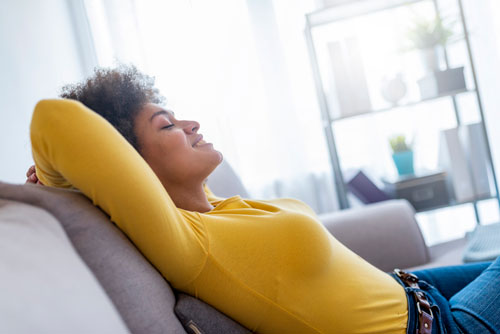We all know the frustration that comes with not being able to fall asleep.
You lie awake, tossing and turning, your mind racing. You know you’ll be miserable the next day because you’ll be exhausted and unproductive.
This thought feeds your anxiety, making it even more difficult to fall asleep.
It’s a vicious cycle.
Here’s something that might break the cycle. It takes the pressure off falling asleep.
It’s called “quiet wakefulness.”
It’s not a substitute for sleep. It’s not as deeply restorative. But it’s beneficial in similar ways. And it can help pave the way for nodding off.
Quiet wakefulness is simply resting with your eyes closed. It’s particularly helpful as an alternative to napping. But it is also useful during nights when sleep doesn’t come easily.
Dr. Christopher Winter is a sleep expert. He consults with sports organizations such as Major League Baseball and the National Basketball Association.
“Most people don’t have complete control over their sleep,” said Dr. Winter. That’s normal. But he points out that anyone can control when they rest.
Quiet wakefulness is refreshing, with many of the same benefits as sleep. It allows your body to relax and lets brain cells take a break. It can increase your alertness and mental clarity, reduce stress, and boost your creativity.[1]
In at least one way, quiet wakefulness actually can be preferable to sleep. A nap can leave you with sleep inertia—a lingering grogginess. But people usually get up from quiet wakefulness feeling alert and energized.[2]
A study from the journal Cell Reports found quiet wakefulness confers benefits comparable to sleep. These include improved problem solving and information processing.[3]
And research from the University of California, San Diego, found people who napped and people who did quiet wakefulness performed the same on a test of visual abilities.[4]
Dr. Winter said that, once you know you can feel rested whether or not you sleep, “that feel-good feeling can feed off itself.” That can actually make it easier to fall asleep.
The Best Way to Do Quiet Wakefulness
The next time you can’t fall asleep. Don’t worry about it. Tell yourself that you’re getting rest through quiet wakefulness. By taking the pressure off, you may fall asleep. If you don’t, no big deal. You’ll still be rested.
Experts point to mindfulness meditation as an excellent form of quiet wakefulness. Research shows it effectively reduces stress and anxiety.[5]
Here’s a step-by-step guide:
You sit comfortably in any quiet place, focus on your breathing, and when your attention wanders, return.
Find a seat. Sit on a chair, a park bench, a carpeted floor—anywhere that is comfortable. You want a stable, solid seat…not a porch swing or rocking chair.
Position your legs. Many people like to cross their legs, but that’s not necessary. Sit so that you can relax.
Sit up. Straighten your upper body, but don’t be stiff. Your back has a natural curve. Let it be there.
Drop your hands. Let your hands rest naturally on your legs.
Look ahead. You can close your eyes or gaze forward without focusing on anything in particular.
Feel your breath. Pay attention to the physical act of breathing. Notice your chest and belly rise and fall. Mentally note breathing in and breathing out.
When your mind wanders… Don’t worry about it. That’s normal. Just go back to paying attention to your breathing. If you nod off to sleep, that’s fine.
Stop. Open your eyes if they were closed. Notice how your body feels. Pause for a moment to consider how you’d like to continue on with your day.
As little as five minutes a day is beneficial. But longer sessions—up to a half hour—or two or three sessions a day, work well for many people.
Quiet wakefulness through meditation can help you stay alert and refreshed throughout the day.
Editor’s Note: Discover the most effective natural methods to improve your health. Read our monthly journal Independent Healing. It’s your best source for unbiased, evidence-based medical information you won’t find anywhere else. To find out more, go HERE.
Related Articles
Protect Yourself from Heart Disease While You Sleep
Is Your Mattress Poisoning You in Your Sleep?
The News About
Sleeping Pills Just Got Worse…
Like this Article? Forward this article here or Share on Facebook.
[1]https://www.sleep.org/articles/resting-vs-sleeping/
[2]https://www.ncbi.nlm.nih.gov/pubmed/15722204
[3]https://www.sciencedirect.com/science/article/pii/S2211124715011444
[4]https://www.ncbi.nlm.nih.gov/pmc/articles/PMC2764830/pdf/nihms110976.pdf
[5]https://www.eurekalert.org/pub_releases/2017-01/gumc-mmt012017.php

